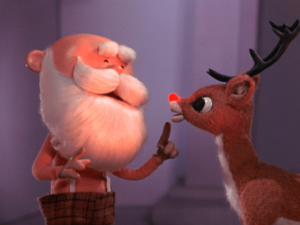Tag: Marisa Gonzales ’18
Letters to Santa
by The Cowl Editor on December 8, 2017
Christmas

Dear Santa,
How is Rudolph doing? I hope good. Is it cold? It’s cold here, but I have a blanket and sweater. My Grammy made it for me. Does Rudolph have a Grammy? Who makes him sweaters? And cookies? And gives him hugs and kisses? The good kisses. Not the sloppy kind my doggie gives me. Do you have any pets, Santa? Oh yeah, the reindeer. Silly me. I made you cookies. The gooey kind. And milk! But my brother ate them. Stupid brother! And my kitty drank the milk. Stupid kitty! My daddy says to not say “stupid.” Don’t tell him, ok? Can you say that word? How old are you? I think three billion! Why don’t you have any kids?
My daddy says I need to write what I want. Ok. I want a pink pony with purple eyelashes and a blue tail. It needs to sing and fly and bake me cookies. Oh, my daddy says I can’t ask for that. Ok. I want a castle with servants and a pool full of jelly. And I want a house made out of candy. And I want a pony, but this time a normal one, but a real one! Please? Oh, my daddy says I need to ask for something you can actually get me so I won’t be disappointed. But, why can’t you give me all of this stuff? You are the greatest man alive! You have powers and a big belly and a jolly laugh and, um, stuff! Yeah. So, I want a rocket so I can go to the moon and eat moon cheese. I like cheese. Do you? What do you like to eat?
Oh, my daddy says I need to stop because I’m running out of paper. I love you Santa and Rudolph and Dancer and
Prancer and the other reindeer I don’t know the names of. Kisses. Oh, and sorry about the milk and cookies. Please still come. I have been good, I promise.
Love and hugs,
Sally

Dear Santa,
I don’t really believe in you. I know I haven’t believed in you for years. Not at all, in fact. So why am I doing this? Why would I write you a letter? I don’t quite know to be honest. I’m not sure I could put it into words, at any rate. So what do I want? That’s the question, right? I don’t think I know anymore. Not to be lonely? Is that an answer? I can’t put my finger down on anything that doesn’t seem to have some sort of baggage and grief on it, but there’s a part of me kicking around that still wants to believe and to hope that something good is out there for my life.
When I was a kid, I guess that meant presents under a tree and a world outside covered in snow. A day of playing with Dad and then hot chocolate inside and watching your clothes get dry in front of the radiator. Then I got older and it changed into more complicated things like money and love and feeling important, and usually we don’t have any of those.
Now you can’t give me what I’m looking for. But I guess if I write you this letter and I remember for a split second what it was like to be a child on Christmas Eve, then at least I won’t forget what it feels like to hope. And that makes all the difference in the world.
Merry Christmas,
Jonathan

Dear Santa,
This year for Christmas, I do not want any gifts from you. I simply want my family to get together. I want them to enjoy themselves in the spirit of the Holidays. I want my siblings and my friends to love the gifts that I have purchased for them. I want you to fly on your big red sleigh through the cold and brisk air with a smile on your face. I want children and parents to scream your name from afar so that you can hear them and know that they are excited for the season of giving to truly begin.
I love you and all that you do for every child around the world. Thank you for changing my meaning of Christmas for the better. Good luck on your journey. I will be thinking of Rudolph and his shiny red nose and you with your big beard and full belly.
Lastly, please eat the cookies that I leave out for you, they are sugar cookies this year. Please make sure that Rudolph eats his carrots as well.
Much love and best regards,
Your Biggest Fan

Dear Santa,
What gives?
Year after year I wrote to you, asking for a puppy—a cute little black pupper with white paws so it looks like he’s wearing socks—and nothing. Every Christmas morning from the ages of 6 to 16, I would run downstairs, eagerly expecting the sight of a wagging tail and the sound of yipping, and instead, all I got were a bunch of Legos, a Playstation, a pair of Beats headphones, an iPhone, and a whole boat load of money.
Seriously, how hard is it to bring me a puppy? When we were 10, you brought my neighbor Jerry and his sister Cathy a kitten, so I think you could figure out a way to leave a puppy under my parent’s tree.
I’m just saying, Santa—if I don’t get a puppy this Christmas, then have fun eating stale cookies from the back of my locker and drinking soy milk next year.
Super Seriously,
His Name Could Be Socko, But You Playin’
The Painter Revealed
by The Cowl Editor on November 9, 2017
Portfolio

by Marisa Gonzalez ’18
White walls surrounded him, cared for him, gave him a home. It had been three years since Ian Michael Emerson was admitted into the Rockville Mental Institution. It had been two years since he started art therapy. No one was really sure what was wrong with him. Ever since the day he was admitted, I. M. Emerson had never left his little corner. This corner became his world, the white walls his canvas.
I.M. Emerson was a great mystery to the nurses. He seemed content in his corner, although nothing was there. It was just him. “It must be lonely,” said one nurse. She was young, too young to understand the beauty of being alone. “It must be boring,” yawned another. She, too, was naive.
Emerson had been listening and smiled. He then closed his eyes and let the white walls consume him. After a year of watching Emerson stare blankly at white walls, one nurse decided he needed a way to express himself. That was how I. M. Emerson got his paintbrush, his magic wand. When a brush, paint, and a blank canvas were placed in front of him, he smiled, his eyes shining. He picked up the brush and carefully dipped it into the red paint, and thus the painter was born.
It was not until May 14 that someone had discovered his secret to contentment. Nurse Plath was a young woman with fair hair and brilliant blue eyes. She had often watched Emerson from afar and marveled at the man’s quiet demeanor. “Too quiet,” Nurse Plath thought. “Something must be going on.” It was on May 14 that she decided to make the mysterious man talk. She took a breath and entered the room.
Once in the room she was greeted by bright, untouched white walls. They were so free and unworn, she suddenly felt happy. As her eyes made her way into Emerson’s corner, that happiness faded away. The walls in his corner were filled with scratches and canvases.
Her eyes glided toward each canvas. They were filled with mixed colors, splattered like a child painted them. She noticed the man, eyes transfixed on his current painting. This made her feel uneasy. Why would a man be so concentrated on a splatter of color? There was simply nothing there. Nurse Plath looked away from Emerson and her eyes fell on a canvas sitting in the center of the room.
This canvas had an actual painting on it. Unlike the others, it was shrouded in vibrant light. As she got closer, she noticed it was a painting of Emerson.
“That is my dream.”
Nurse Plath jumped. She turned and saw Emerson. No one had really seen him before. He looked old, as he was draped in darkness from the corner. However, when he came toward the canvas in the middle of the room, he lit up. Youth and ambition exploded from him. He smiled crookedly.
“It’s nice,” Nurse Plath smiled. She then looked back at the wild colors of the other canvases and asked, “Why has this painting not been put up?”
Emerson tilted his head. His eyes crinkled. “Why do you ask?” he inquired.
Nurse Plath smiled politely, “Well, it is quite beautiful.”
Emerson nodded his head slowly in understanding. “Indeed, but that painting does not portray life. It’s only a dream. True life is chaotic and one needs to find beauty in the madness.”
He stepped back into the corner and was once again engulfed by darkness. His appearance returned to that of an old man. “This is my reality,” he stated. “And I am content.”
Hidden Beneath
by The Cowl Editor on October 5, 2017
Poetry

by Marisa Gonzalez ’18
Beneath the murk,
Beneath the sea,
A World is hidden,
From you and me.
From the surface
One could see
A web of branches
As wondrous as can be.
Underwater
There is more.
A whole garden
At its core.
Flowers grow.
Creatures roam.
For thousands
It is home.
Families form.
Children play.
A city thrives,
Growing every day.
Under the surface,
Just below your feet,
Is this world,
Hidden beneath.
A House’s Heart
by The Cowl Editor on September 14, 2017
Portfolio

by Marisa Gonzalez ’18
Portfolio Staff
Green vines entangled the old brick house, sucking the life out of it. Not that there was much life to suck out, as Old Gladys had passed, but the brick house was being consumed and the sight was scary. There was a time when I thought the house was always scary, even without the vines, but that was because of Gladys and the stories that swarmed around her. Now, the house was a simple house. A poor house being overrun by little green monsters.
It was strange to see such a scary house be so vulnerable. I wondered if Gladys was ever vulnerable. Perhaps deep down she was a sweet old lady. One that would read to her grandchildren and bake cookies. Or maybe she was simply the witch who occupied the house. I wanted to know. I yearned to know, but 10-year-old me was simply too scared. She was too scared by the stories of the house and its occupant. Too afraid of the cracking of the branches and screeching of the bats. She was young, and stupid, and frightened by the unknown. She stayed clear of that house until the magic had died. By that point it was too late. Too late to get to know the woman inside. All that was left was a house.
When Gladys died, the children cheered. They were no longer afraid to venture outside and took every opportunity they had to walk past the house and stick their tongue out. I was humored by this and participated a few times. I never realized I was disrespecting someone’s memory. I thought I was getting back at the woman who terrorized the children. I thought I was being brave. Oh, how stupid I was to listen to the stories. I was childish and I hate myself for it. So many lost opportunities because I listened to the silly tales.
The tales still follow me today. They come in my dreams. I hear them whisper in my ear as I walk past the house. The childish tales of Gladys being a witch who performed black magic to stay alive. The frightening tales of her eating her grandchildren and the ones the parents often spoke of, the tales of her being a crazy woman who spoke in tongues. These tales come to me in my dream and I cry for what I never knew. Or sometimes I laugh at my stupidity. But mostly, when the dreams appear and the whispers come, I smile as I remember the day that changed everything.
The old brick house lost its occupant when I was about to turn 11. It stayed empty for four years until a realtor became brave enough to try to sell it. The neighborhood was tasked with cleaning the house since Gladys appeared to have no family. I was the lucky one to go in first. No one else wanted to do it, and my parents told me I would get a car. Of course, at 15, I would not be able drive it, but it was a big deal for a teen. I swallowed my fear and went inside.
The house was trapped in spiderwebs with dust sprinkled upon them. I had to swat at one to make my way through the door, causing the dust to swirl around me. I lost my sight and bumped into a table which led to something falling onto the floor. This caused more dust to fill the air. When the dust cleared, I could see a book. Curiosity overcame me and I decided to pick it up. I pushed some of the dust off and saw that the book was blue and battered. When I opened it, I noticed cursive writing inside. The handwriting was neat and delicate as if a fragile child had written it. I began to read.
What I read broke my heart. The book was a journal, telling a tale of sorrow and heartache. I had found Gladys’s heart and I did not know what to do with it. So, I sat down on the dust covered floor and continued reading. As I read, the room suddenly became brighter. The dust cleared away and the spiderwebs vanished. The house began to breathe and I could feel something embrace me. I felt comforted and warm and alive. I never wanted to leave. Gladys was with me like she had never been before.
I now understood the old woman who stayed in her house all alone. She had no one. Her family had passed long before her. She was a mystery, and the neighborhood hated the unknown. No one wanted to know about her, only speculate. If only our fear did not get to us. If only our hearts were open. I sat on the floor in the newly revived house and cried.
Now as I stare at the old brick house being eaten away by the vines, I remember feeling so alive and warm. I remember reading about the real Gladys, seeing inside her heart. As I stare, I feel the love I wish I could have given her. But, while I feel sad, I also feel a little happy. Happy that someone was able to know the real Gladys and happy that she now has real stories to be told about her. I stare at the vine covered house and feel the warm sun on my back and the comforting embrace of the breeze. I feel Gladys.
